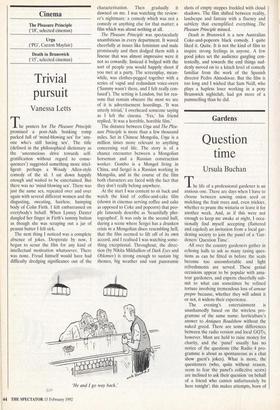Gardens
Question time
Ursula Buchan
The life of a professional gardener is an anxious one. There are days when I have to choose between sowing onion seed or mulching the fruit trees and, even trickier, whether to prune the wistaria or leave it for another week. And, as if this were not enough to keep me awake at night, I occa- sionally find myself accepting (flattered and cajoled) an invitation from a local gar- dening society to join the panel of a 'Gar- deners' Question Time'.
All over the country gardeners gather in echoing halls to ask as many taxing ques- tions as can be fitted in before the seats become too uncomfortable and light refreshments are served. These genial occasions appear to be popular with ama- teur gardeners, and experts cheerfully sub- mit to what can sometimes be refined torture involving tremendous loss of amour propre because, whether they will admit it or not, it widens their experience.
The evening's entertainment is unashamedly based on the wireless pro- gramme of the same name: horticulture's answer to Antiques Roadshow without the naked greed. There are some differences between the radio version and local GQTs, however. Most are held to raise money for charity, and the 'panel' usually has no notice of the questions (the Radio 4 pro- gramme is about as spontaneous as a chat show guest's jokes). What is more, the questioners (who, quite without reason, seem to fear the panel's collective scorn) are inclined to ask their question 'on behalf of a friend who cannot unfortunately be here tonight'; this makes attempts, born of desperation, by the panel to elicit further and better particulars quite impossible.
Members of the audience really need not worry. The scorn, if any, is far more likely to come from them on the occasions when they stump the panel. This usually happens when a question begins, 'What is wrong with my . . . ', which occurs with remark- able frequency. Indeed, one could be for- given for thinking that problems interest gardeners, at least those prepared to turn out on a foggy night, more than pleasure.
We panellists usually have no trouble choosing a selection of climbers for a north wall, listing the ifs and buts of organic gar- dening or warning of the adverse effects of central heating on the leaves of Aglaonema. But pests and diseases can shut us up com- pletely. Of the many ills which can affect garden plants, only some afflict some, sometimes. The universal nightmares — whitefly, powdery mildew, aphids, honey fungus and botrytis — are a mere drop in a bucket of thiophanate-methyl in compari- son with all the problems which may be found in British gardens. Apple chat fruit mycoplasma, cherry rusty mottle virus (European), Douglas fir adelgid, bean halo blight or salsify smut: you name it, some- one, somewhere will have stumbled on it.
We are blessed, in the East Midlands, with a peculiar density (I mean numbers, not intellectual capacity) of experienced and practically minded garden writers. This is because EMAP, which publishes, inter alia, Garden News, Garden Answers and Practical Gardening, is based in Peterbor- ough. Yet I have known one or two of these stalwarts — even veterans of a spell on the Letters page — bring along their Collins Guide to the Pests, Diseases and Dis- orders of Garden Plants, just in case. Even that may be useless, however, for the leaf brought up to the panel's table in a sweaty polythene bag has often decomposed too long ago for there to be any hope of recog- nising what it is, let alone what is wrong with it. Just as not all of us with Scottish names are necessarily Rob Roy, so not all garden writers are Dr Stefan Buczacki.
Even if Madam Chairman's judicious pruning of the questions beforehand has reduced the P and D quotient, the result is not always more encouraging. Old favourites to which I look forward with a particularly keen sense of anticipation include, 'What is your funniest gardening memory?' and, 'What do the members of the panel most like to wear on their feet?'
My next engagement of this kind is to be at Thorpe Hall, Peterborough, in aid of the excellent Sue Ryder Foundation. If you would like to see me twist and turn, like a poorly etherised butterfly on a pin, come along on Friday, 28 February, at 7.30 p.m. And don't forget that sweaty polythene bag.
Ursula Buchan's book, Wall Plants and Climbers (Pavilion, £12.95), will he pub- lished at the end of this month.



























































 Previous page
Previous page